Проектна робота на тему "The Most Significant Historacsl Places of London"
Проектна робота на тему "The Most Significant Historacsl Places of London" знайомить учнів з найвизначнішими істроичними місцями Лондона. Даний проект сприяє поглибленню знань учнів про історії та культури країни, мову якої вони вивчають.


![]()
From Tower Bridge you can see the Tower of London. It is the oldest building in the city. It dates from the Roman times. The Tower consists of a group of structures built around a central tower and surrounded by two stone walls. The walls of the Tower are five meters thick.
The Tower of London is like a mirror of many important events in the English history. Many centuries ago it was a fortress, a royal palace and then a prison. Nowadays it is a museum of arms. There are hundreds of interesting collections in it. Many people from other countries come to see it. In the museum they can see many old guns.
In the gardens of the Tower you can see the black ravens. The English people like them very much. The Raven Master looks after the ravens and gives them meat in the morning and in the evening. There is a legend that the Tower and the kingdom will fall if it loses its ravens.
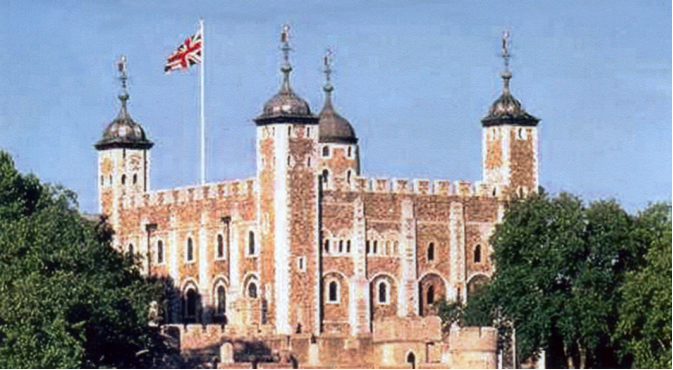
Tower Bridge
Tower Bridge was opened with great ceremony on 30 June 1894. It takes its name from the Tower of London. The hydraulic mechanism can raise and lower the bridge in about one and a half minutes. The covered walkway between the two towers is open to the public and offers a spectacular view of London.
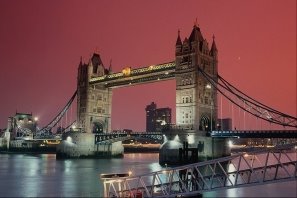
Tower Bridge History
Originally, London Bridge was the only crossing over the Thames. As London grew, so more bridges were added. But these were all to the west of London Bridge, since the area east of London Bridge had become a busy port. In the 19th century, the east end of London became so densely populated that public pressure mounted for
a bridge to the east of London Bridge. Finally, in 1876 the City of London Corporation, who were responsible for that part of the Thames, decided that
the problem could be put off no longer. The big problem for the City of London Corporation was how to build a bridge downstream from London Bridge without disrupting river traffic activities. It took eight years for the building of the bridge.
It was hydraulically operated bridge, using steam to power the enormous pumping engines. The bridge was officially opened on 30 June 1894 by the Prince of Wales,
the future King Edward VII, and his wife Alexandra of Denmark.
The bridge connected Iron Gate, on the north bank of the river, with Horsley down Lane, on the south – now known as Tower Bridge Approach and Tower Bridge Road. It largely replaced Tower Subway, 400 m to the west, the world’s first underground railway (1870). Until the bridge was opened, the subway was the shortest way to cross the river from Tower Hill to Toole Street in Southward.

![]()
Westminster Abbey is one of the oldest royal churches. It is situated opposite the Houses of Parliament. The church is more than 900 years old. It is full of history. This ancient (old) building was founded in the eleventh century as
a monastery. Most British kings and queens were crowned and buried there. Many famous people were buried here, too. Among them: Newton, Darwin, Dickens and Kipling. There in the Poet’s Corner there are memorials to Shakespeare, Burns, Byron, Thackeray and Scott. Westminster Abbey is
a symbol of English tradition. It is also one of the oldest churches in Europe.


St. Paul’s Cathedral is the greatest of all English churches, dates back to the 17th century. Inside the Cathedral one can see monuments to many famous people of England. Admiral Nelson is buried here too. This cathedral is also famous for its Whispering Gallery. In this Gallery the slightest whisper is audible 100 feet away.
In addition to this I would like to say that the cathedral was designed and built by an outstanding English architect Christopher Wren in 1710. It took him
35 years to build this magnificent building with many columns. When Christopher Wren died he was buried in the cathedral too. It is the most wonderful classical church in Britain and the second biggest cathedral in the world.
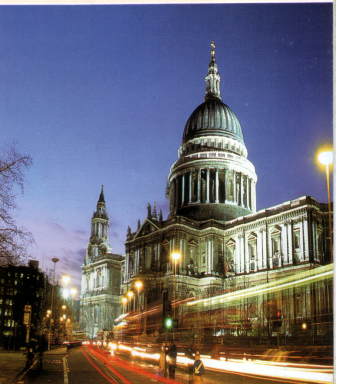
![]()
Buckingham Palace is the official London residence of the Queen and her family. This palace was built in the 18th century. The first monarch who took residence there was Queen Victoria. When the flag is flying on the top of the palace, the Queen is at home. In front of the palace there is a Monument to Queen Victoria, who was one of the most famous British queens. She ruled more than any other and made England strong.
Buckingham Palace is like a small town with a hospital, a police station, two post offices, two sports clubs, a cinema, a bar, a disco and
a swimming pool. There are 600 rooms and three miles of red carpet. About 700 people work in the palace. It is also the place where presidents, kings and politicians go to meet the Queen.
The famous Changing-of-the-Guard Ceremony in front of the palace attracts many tourists. It takes place every day at 11.30 a.m. and lasts half an hour.
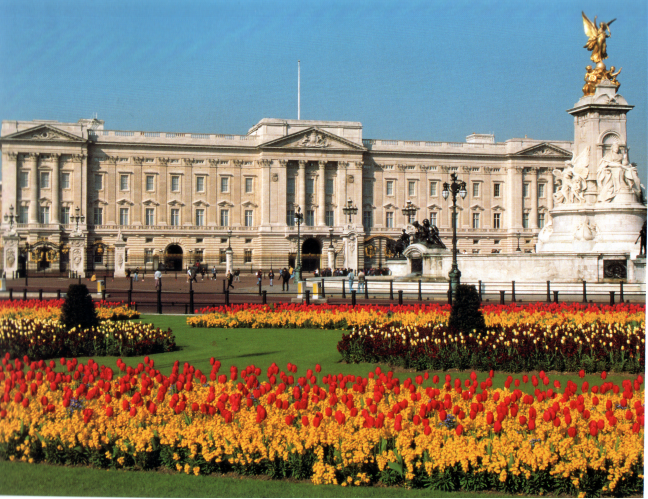

On the banks of the river Thames you can see Westminster Palace, usually known as the Houses of Parliament. Once a royal palace the Houses of Parliament are now the seat of the British Government and the heart of the Commonwealth. It is a very large building with two high towers at the corners: the Victoria Tower and the Clock Tower. When the Parliament is in session, the British flag (called the Union Jack) flies over the Victoria Tower by day, and the light burns in the Clock Tower by night.
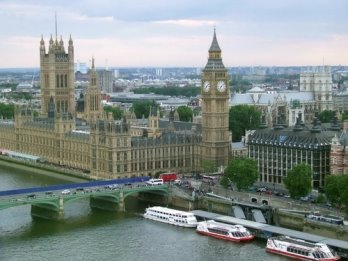

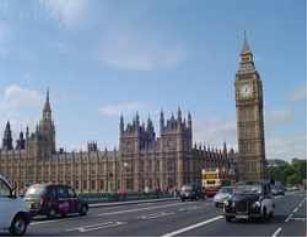
The Clock Tower is famous for its bell, known as Big Ben. The building of Westminster Palace is very beautiful with its two towers and a big clock.
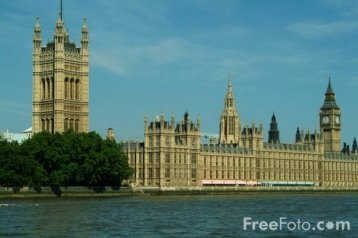

![]()
At the north end of Westminster Palace there is a famous clock tower, Big Ben. The Clock of the Tower has four faces and a very big loud bell. The clock bell was called Big Ben after Sir Benjamin Hall, who was the man in charge of the building. He was a very tall man. His nickname was Big Ben. So, people called the bell Big Ben too. Now the bell is known all over the world by that name. In fact Big Ben is really the name of the bell in the tower, not of the clock. The people of London can hear the sound of the bell every hour. It is the largest clock in England and the symbol of London.
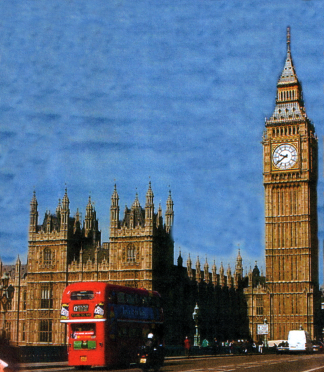
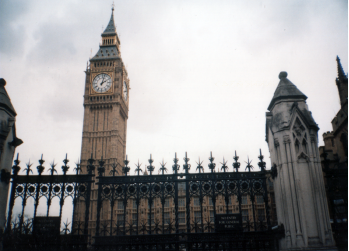
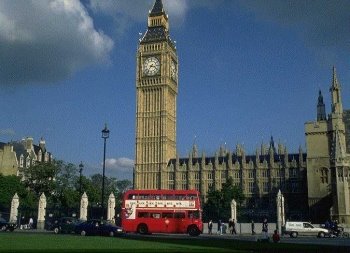
The Most Famous Squares of London:

There are many beautiful squares in London. People who visit London for the first time usually start their trip from Trafalgar Square. It is in the centre of the West End. There stands Nelson’s Column, a monument to a British admiral. He is a well-known person in the history of the country. Admiral Nelson defeated the French at the Battle of Trafalgar in 1805.
Not far from Trafalgar Square there is Piccadilly Circus. It is a meeting place of six streets. This square is round. London’s well-known theatres and cinemas are on Piccadilly Circus.
![]()

Trafalgar Square
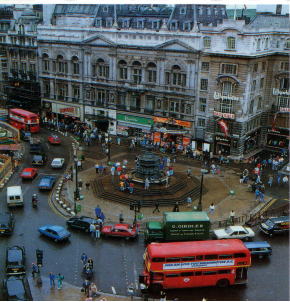
Piccadilly Circus
![]()
![]()
London is known for its art museums and galleries. I would like to mention one of all London’s great art collections. It’s the National Gallery which contains Britain’s best known collection of 2,200 pictures.
The Gallery is rich in paintings by English masters: Turner, Gainsborough and Constable.
The National Gallery is one of the greatest museums of art in the world. It has the collections of all the important art schools. Almost all old masters are represented there. It includes, for example, 19 Rembrandt’s paintings. The National Gallery was founded in 1824 and houses one of the finest art collections in the world.
There are also many other famous picture galleries in London, such as the National Portrait Gallery, the Tate Gallery and so on.

![]()
Built in the first half of the 19th century, the British Museum is one of the largest museums in the world. It is one of the most interesting sights of London. Its library is the greatest in England. The library contains books written by the authors of all times and countries. Its famous exhibits include the works of man from prehistoric times to the present day. This is the world famous museum.
The British Museum Library contains more than six million books. The library has a collection of rare books and manuscripts, including the earliest editions of Shakespeare. Here also is a collection of books and original Dickens’ manuscripts and letters.
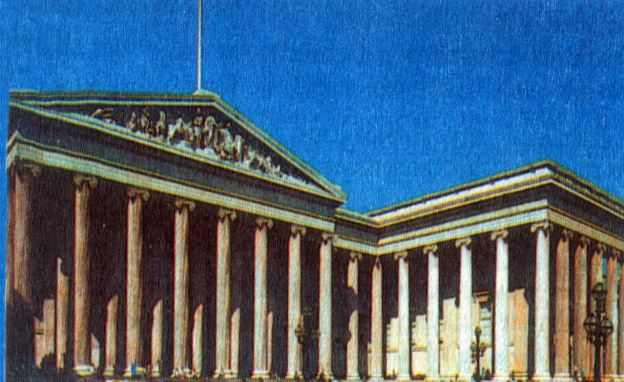
![]()
London’s largest parks are the royal parks. They belong to the British monarchs, but are open for public use. Central London has five royal parks: St. James’s Park, Green Park, Hyde Park, Kensington Gardens and Regent’s Park.
Hyde Park is famous for Marble Arch, a triumphal arch near its north-east corner, and for Speakers’ Corner, close to the arch. Large crowds gather at Speakers’ Corner to hear people express their opinions on politics, religion, and many other topics. Hyde Park also has a lake called the Serpentine, popular with Londoners for boating, fishing and swimming.
St. James’s Park has a large lake with wild ducks and swans. The Mall is a street which on the north of St. James’s Park forms the chief route for royal parades.
Green Park is noted for its shade trees and walking paths.
Regent’s Park contains the famous London Zoo.
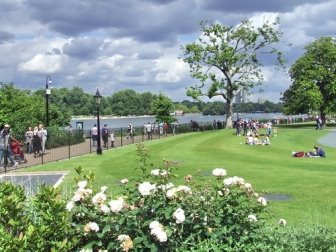
Hyde Park
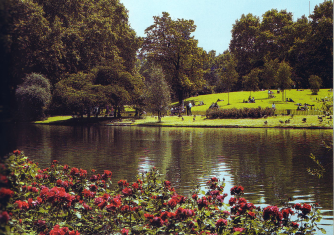
St. James’s Park
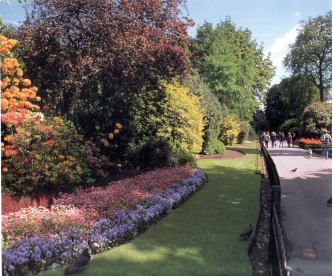
Kensington Gardens
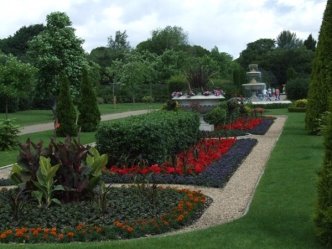
Regent’s Park


про публікацію авторської розробки
Додати розробку
